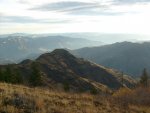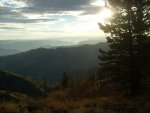For me a few critical areas are:
1) Research your area, and research it some more. Topo maps, aerial / satellite maps, gps maps, Eastman MRS, etc.
Phone conversations with biologist / game warden and have your maps out and questions written down prior to calling and take good notes of details. For a first timer, you can not do enough research of your area. There is just no way to get an accurate picture in you mind of the terrain and conditions you will encounter, until you put your feet on the ground and spend some time there. But once there, your research will help the puzzle start to come together.
2) Good optics and know how to use them. Binoculars AND a good spotting scope with good tripod and head. I followed this advise from this forum and my Vortex Razor 65mm spotter was extremely valuable at finding bedded deer. I probably saw 2X as many deer because of my spotter.
3) Best mountain boots you can afford and get them broken in before the hunt. Don't skimp here. They are expensive for a reason.
4) Be in the best physical condition you can be in and get used to carrying some weight in you pack. Just understand, as someone that lives at lower elevation, you will be sucking wind in the mountains the first few days regardless of your conditioning. Just take it slow and let your body acclimate to the elevation.
5) A few pounds here and there add up and feel like a load of bricks in you pack. Try to buy the best and lightest pack / gear you can afford / justify.
6) Merino wool base layers and socks. Don't leave home without it. Understand that good whitetail hunting clothing is not necessarily good clothing for western / mountain hunting. Research what most experienced western hunters recommend for clothing.
7) Have fun and enjoy the experience. You are probably not going to kill a good buck / bull on your first DIY hunt. If you do that is great, but not the norm. Look at your first DIY trip as the beginning of a learning process and just enjoy the whole experience. Western hunting can get into your blood and become a year round process, regardless where you live.



